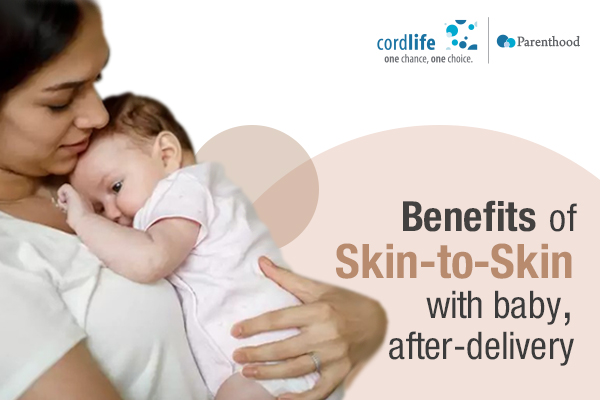Table of Contents
- Importance of Skin-to-skin Contact For Your Baby
- Keeps the Body Temperature Regulated
- Stabilises Your Baby’s Breathing and Heartbeat
- Skin-to-skin Contact While Breastfeeding Regulates Blood Sugar in Your Baby
- Skin-to-skin Care Makes Your Baby Cry Less
- Importance of Skin-to-skin Contact for You
- Can Dads Have the Benefits of Skin-to-contact With Newborns?
The moment the nurse places your newborn in your arms or puts your baby on your chest; begins the first magical golden hour of bonding between you and the mewling little one. Skin-to-skin contact with your baby is commonly practiced by many hospitals. Hospitals even recommend many of you continue this practice long after the first hour. At least as long as both you and your baby are comfortable. Research has shown in these 60 minutes, you can maximise your bond with your baby, and you start knowing each other very well. Moreover, this hour is very crucial for your baby’s growth and development.
Is that all? Not at all!
Skin-to-skin contact after birth has many more benefits both for you and your little one.
Importance of Skin-to-skin Contact For Your Baby
Your baby may be born full-term or via an emergency C-section, the hospital staff or nurse covers your newborn with a warm blanket and gets your baby settled on your chest to give the pleasure of skin-to-skin immediately after birth both to you and your baby. In fact, the earlier you start skin-to-skin the better it is. Therefore, the numerous benefits of having skin-to-skin contact with your little one includes:
Keeps the Body Temperature Regulated
After birth, your baby may not be able to keep his or her own body warm. Your body acts as a natural body warmer for your baby. The specialists in the hospital or nursing home, as already mentioned above, can simply make your baby lie down on your abdomen and chest, take measures to dry the baby off while he or she’s still there, and cover the baby with a warm blanket, to keep your little one warm! The impact becomes clearer with the skin-to-skin while breastfeeding. Roughly 90% of full-term neonates are medically recommended to breastfeed in the first 28 days of their life to keep his or her body temperature regulated.
Stabilises Your Baby’s Breathing and Heartbeat
While being in the womb, the baby receives oxygen through the placenta which aids in the foetal development and the umbilical cord. After the birth, the newborn’s lungs are filled with fluid and the baby may start breathing after 10 seconds, but breathes with gasps. Uninterrupted skin-to-skin care regardless of the breastfeeding session will help your baby adapt himself or herself to the life outside the mother’s womb by helping him or her breathe easily and stabilises the heartbeat. Additionally, perhaps the sound of your heartbeat is also familiar to your baby, and skin-to-skin after birth stabilises your baby’s heartbeat too.

Skin-to-skin Contact While Breastfeeding Regulates Blood Sugar in Your Baby
While being snuggled in your womb, your baby will get glucose via the placenta. However, if your baby has more requirements for glucose, after birth, he or she can get it from your breastmilk (Fructose, glucose, and lactose are present in breast milk).
Skin-to-skin Care Makes Your Baby Cry Less
Babies cry initially at birth. Some refer to this crying to be a “separation distress call”. Your chest is the best place for your baby to adjust his or her life outside your womb. So, the touch of your skin with the initial snuggling and cuddling of your baby, helps the baby cry less.
Importance of Skin-to-skin Contact for You
It’s not just the babies who are benefitted, mothers are also benefited. Here are some of the benefits of skin-to-skin contact for the new moms:
Promotes Bonding
While having skin-to-skin contact with your baby, oxytocin hormones get released. These are also known as “love hormones”, which spark the feelings of love and care for your baby and help you create a protective environment for him or her.
Encourages Breast-milk Production
The increase of oxytocin hormones in you, stimulates your breast milk production and you’re likely to nurse for a long period of time.
Skin-to-skin Contact Reduces Postpartum Depression
Studies reveal that skin-to-skin care after your infant’s first month of birth helps in alleviating your stress and anxiety, thus reducing your risk of postpartum depression.
Can Dads Have the Benefits of Skin-to-contact With Newborns?
Yes! In fact, the skin-to-skin benefits with a dad include bonding with the baby, feeling more confident as a father, and feeling protective towards the little one.
To know more about baby care and cord blood banking, follow our blog page.
